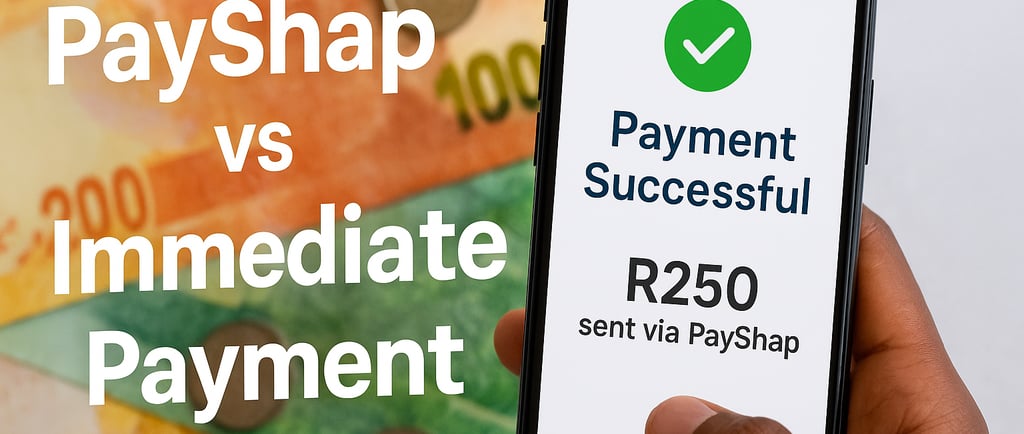PayShap vs Immediate Payment: What You Need to Know About Fees, Limits & Bank Differences
South Africa’s payment system is evolving — and PayShap is at the centre of this digital revolution. If you’ve noticed the “PayShap” option in your banking app recently, you’ve already seen a glimpse of the country’s future in payments. In this guide, we’ll explain what PayShap is, how its fees compare across banks, and how it differs from the older Immediate Payment or Instant EFT options.


⚙️ What Is PayShap?
PayShap is South Africa’s new real-time payment system that enables users to send and receive money instantly — 24/7, even between different banks.
It was launched through collaboration between the South African Reserve Bank, BankservAfrica, and major local banks to make digital payments faster, simpler, and more affordable.
Instead of typing in long bank account numbers, you can send money using a ShapID — which is usually your cellphone number or a registered nickname.
🔑 Key PayShap Features
⚡ Instant transfers — funds reflect in seconds
🕒 24/7 availability — including weekends and public holidays
☎️ Easy to use — send money using just a cellphone number
💰 Affordable — lower fees than Immediate Payments
🛡️ Secure & verified — supported by South Africa’s major banks
💸 Limit increased to R50,000 per transaction (from R3,000 previously)
💰 PayShap Fees and Charges Between Banks
PayShap was designed to be low-cost, particularly for smaller, everyday payments.
However, banks are free to set their own pricing — so fees vary slightly.
Below is an overview of what South Africa’s leading banks charge for PayShap transactions:
Bank Typical PayShap Fee Notes
Absa Around R7.50 Some small ShapID payments under R100 are free
Standard Bank R7.50 flat fee Applies to most PayShap transactions
Nedbank R1 – R7.50 Tiered pricing based on amount
FNB About R7 Usually cheaper than Immediate Payment
Capitec R3 – R5 Intra-bank transfers often free
TymeBank Free No fees for PayShap
Investec Free up to R500, small fee beyond Targeted at private clients
💡 Tip: Many banks offer free PayShap transfers for small amounts (typically under R100) to drive user adoption. Always check your bank’s latest pricing guide for updates.
🔄 PayShap vs Immediate Payment: What’s the Difference?
Many South Africans confuse PayShap with Immediate Payment (or Instant EFT).
While both move money instantly, they work on different systems — and their fees, limits, and availability differ significantly.
Feature PayShap Immediate Payment (Instant EFT)
Payment rail New national real-time payments system Traditional EFT “fast track” option
Identifier used ShapID or cellphone number Full bank account details
Availability 24/7, including weekends Limited by bank processing hours
Transaction limit Up to R50,000 Up to R250,000+, depending on bank
Fees R0 – R7.50, often free R10 – R50+, depending on amount
Speed A few seconds A few minutes (sometimes delayed)
Best for Everyday low-value payments Larger, once-off transfers
✅ In summary:
PayShap is cheaper and simpler for small transfers, while Immediate Payment remains suitable for higher-value transactions.
🏦 Why PayShap Matters for South Africans
PayShap isn’t just another feature — it’s a modern payment revolution that benefits both personal and business users.
🌍 Benefits for Everyday Users
Pay friends and family instantly with just their phone number
No waiting times or clearance delays
Affordable or free transfers for small amounts
Safer alternative to cash
💼 Benefits for Small Businesses
Instant settlements improve cash flow
Lower fees than card machines or EFTs
Less cash handling means better security
Builds trust with instant proof of payment
💡 Tips for Using PayShap Wisely
✔️ Register your cellphone number as your ShapID — it makes receiving money easier.
✔️ Double-check recipient details before sending (transfers are final).
✔️ Use PayShap for everyday amounts like paying vendors, side hustles, or splitting bills.
✔️ Stay updated — fee structures and limits may evolve as more banks join.
🔮 The Future of Instant Payments in South Africa
With PayShap growing in adoption, South Africans can expect:
Broader rollout across all major banks
Reduced reliance on cash and EFT delays
Lower transaction fees as competition increases
Seamless integration into e-commerce and fintech platforms
As the system evolves, PayShap is positioned to become South Africa’s standard for everyday digital payments — fast, safe, and cost-effective.
Conclusion
PayShap is transforming the way South Africans move money.
It offers instant, 24/7 transfers at a fraction of the cost of Immediate Payments — making it perfect for both individuals and small businesses.
If your bank supports PayShap, register your ShapID today and experience the convenience of instant, low-cost payments.
